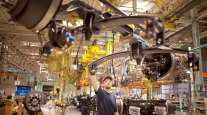Senior Reporter
July Class 8 Orders Lift Off Along With Freight Volumes

[Stay on top of transportation news: Get TTNews in your inbox.]
North American Class 8 orders in July inched past replacement levels and increased 98% compared with a year ago, ACT Research reported.
Industry experts pointed to resurgent, recovering freight volumes.
Orders reached 20,300, according to ACT, which cited truck makers’ preliminary data. North American monthly replacement levels are considered to be about 19,000 units.
July’s total was the highest since last October, when they were 21,864.

Tam
“The increase in orders may have at least part of its explanation in the current freight environment, which appears to be recovering more quickly than previously anticipated. In turn, that is leading to higher freight rates, in both the spot and contract markets,” ACT Vice President Steve Tam said.
“As profitability improves, it is typical for truckers to invest those profits in new equipment. The conundrum this cycle is that trucks are sidelined by drivers who are collecting unemployment, creating somewhat of an artificial capacity constraint. The industry does not need more trucks, it needs to re-deploy the ones it has first,” he said.
FTR pegged preliminary orders at 20,000.

Starks
“Absolute [freight] volumes are still expected to be much weaker than before the pandemic for the time being, but the return of some volumes was enough to induce fleets to put in orders that they normally might have completed back in March, April and May,” said Jonathan Starks, chief intelligence officer at FTR.
“Carriers are happy that volume levels have returned to some type of ‘normal,’ but the concerns involving the high coronavirus case numbers and the fact that we have such high unemployment gives us pause to think that the recent activity will not be sustained,” Starks added.
That could mean the prime ordering season from October through December may not be as typically strong as FTR initially hoped, he added.
One less-than-truckload carrier placed a total of 75 Class 8 orders in July, spread among multiple truck makers.
“It was a mix of tandem- and single-axle tractors across three truck makers: Volvo, Freightliner and Peterbilt,” Daniel Carrano, vice president of fleet maintenance at A. Duie Pyle Inc. told Transport Topics. He said delivery would come in the October-November time frame.
A. Duie Pyle operates a total of 1,280 tractors and ranks No. 70 on the Transport Topics Top 100 list of the largest for-hire carriers in North America.
Its July order included some additions, but was mostly replacement trucks, John Luciani, the carrier’s chief operating officer, added.
“Our business has started to come back. It is not all the way back,” he said. “July 2020 over July 2019, we were just about flat on bill count. We were [pre-pandemic] forecasting a 6% growth and that would be 3% in bill count and 3% in yield improvement.”

Carrano
Carrano noted that ordering from three truck makers allows the carrier to work with three order boards. “There is a pricing advantage when you are working with more that one truck maker.”
Also, it limits exposure to fleetwide recalls or other issues compared with having all trucks be from one truck maker, he added.
Meanwhile, one very large order could emerge when YRC Worldwide begins to spend about $400 million on upgrading its aged fleet as part of a larger federal coronavirus relief loan. It operates a fleet of about 14,000 tractors and ranks No. 6 on the for-hire TT100.

Pierson
“So, it’ll be a while before we take our first delivery. But once we do, we expect a roll with a certain amount of pace and intentionality to get as much in as quickly as we possibly can,” YRC Chief Financial Officer Jamie Pierson said during a recent earnings call. “It’s going to take us probably the better part of four, maybe up to six quarters for all $400 million to work.”
Another carrier executive said rates are going in the right direction, but there’s a caveat.
“There’s a lot of folks that have had a lot of pain in their networks, especially in the second quarter, that are going to be I think pretty reluctant to just throw trucks against that volume,” Werner Enterprises CEO Derek Leathers said during a recent earnings call. “They need rates first, and that’s where they’re going to focus and they need to focus there.
“We’ve certainly got orders coming, and in some cases some elevated [capital expenditure] in the back half. But it’s replacement, and it’s because we have to make up for the fact that we had supply disruptions, and we’re having to relook at our order rate and make sure to keep our fleet new and young. We’ve got to keep [drivers] in the right equipment.”
Werner Enterprises ranks No. 16 on the for-hire TT100.
Want more news? Listen to today's daily briefing:
Subscribe: Apple Podcasts | Spotify | Amazon Alexa | Google Assistant | More




